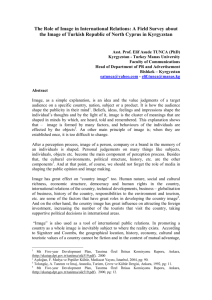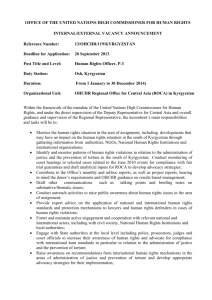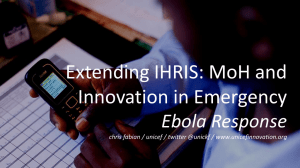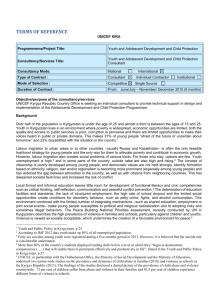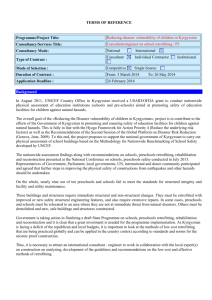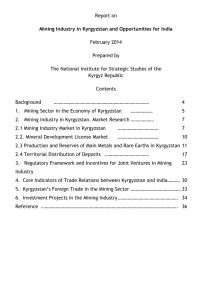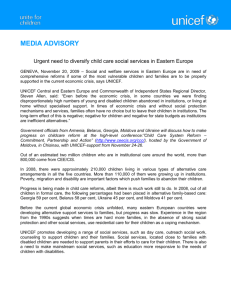terms of reference.
advertisement
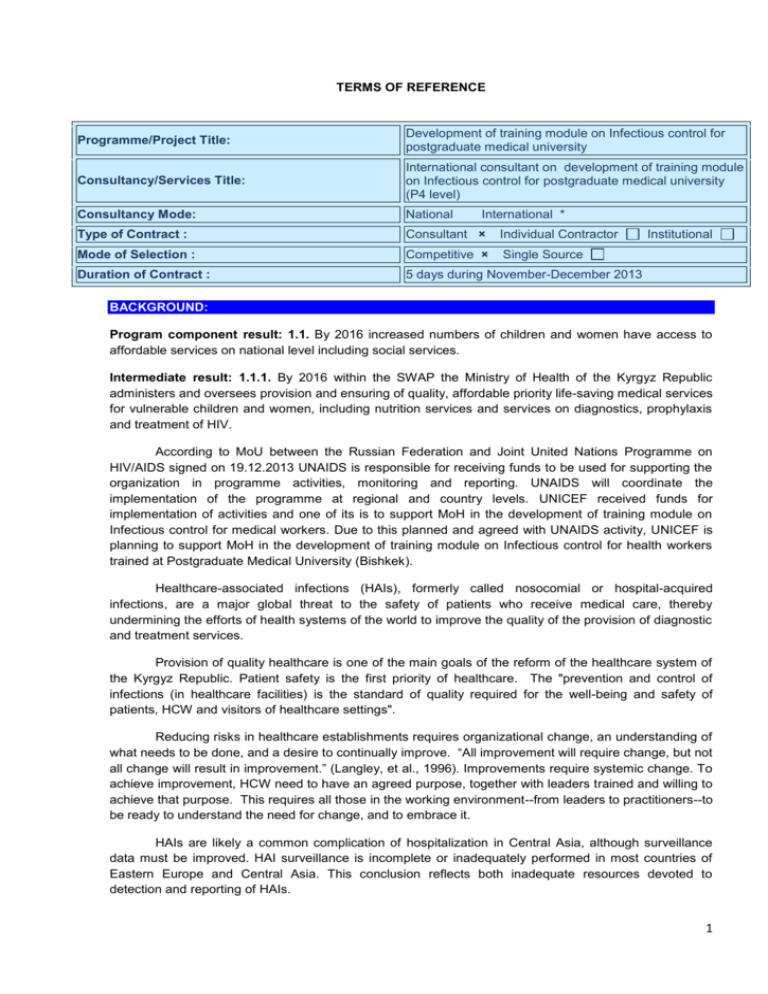
TERMS OF REFERENCE Programme/Project Title: Development of training module on Infectious control for postgraduate medical university Consultancy/Services Title: International consultant on development of training module on Infectious control for postgraduate medical university (P4 level) Consultancy Mode: National Type of Contract : Consultant × Individual Contractor Mode of Selection : Competitive × Single Source Duration of Contract : 5 days during November-December 2013 International * Institutional BACKGROUND: Program component result: 1.1. By 2016 increased numbers of children and women have access to affordable services on national level including social services. Intermediate result: 1.1.1. By 2016 within the SWAP the Ministry of Health of the Kyrgyz Republic administers and oversees provision and ensuring of quality, affordable priority life-saving medical services for vulnerable children and women, including nutrition services and services on diagnostics, prophylaxis and treatment of HIV. According to MoU between the Russian Federation and Joint United Nations Programme on HIV/AIDS signed on 19.12.2013 UNAIDS is responsible for receiving funds to be used for supporting the organization in programme activities, monitoring and reporting. UNAIDS will coordinate the implementation of the programme at regional and country levels. UNICEF received funds for implementation of activities and one of its is to support MoH in the development of training module on Infectious control for medical workers. Due to this planned and agreed with UNAIDS activity, UNICEF is planning to support MoH in the development of training module on Infectious control for health workers trained at Postgraduate Medical University (Bishkek). Healthcare-associated infections (HAIs), formerly called nosocomial or hospital-acquired infections, are a major global threat to the safety of patients who receive medical care, thereby undermining the efforts of health systems of the world to improve the quality of the provision of diagnostic and treatment services. Provision of quality healthcare is one of the main goals of the reform of the healthcare system of the Kyrgyz Republic. Patient safety is the first priority of healthcare. The "prevention and control of infections (in healthcare facilities) is the standard of quality required for the well-being and safety of patients, HCW and visitors of healthcare settings". Reducing risks in healthcare establishments requires organizational change, an understanding of what needs to be done, and a desire to continually improve. “All improvement will require change, but not all change will result in improvement.” (Langley, et al., 1996). Improvements require systemic change. To achieve improvement, HCW need to have an agreed purpose, together with leaders trained and willing to achieve that purpose. This requires all those in the working environment--from leaders to practitioners--to be ready to understand the need for change, and to embrace it. HAIs are likely a common complication of hospitalization in Central Asia, although surveillance data must be improved. HAI surveillance is incomplete or inadequately performed in most countries of Eastern Europe and Central Asia. This conclusion reflects both inadequate resources devoted to detection and reporting of HAIs. 1 Currently several training modules on Infectious control at health facilities are existing. For Kyrgyzstan it is important to develop a training module on IC based on available evidence based literature, developed training modules, with reference to the local normative base and regulations. Improving safety of medical procedures and prevention of HAIs is a major challenge in Kyrgyzstan, requiring coordinated action by national health authorities, development partners and donors. There is a need to mobilize local expertise in the area, but also to ensure participation of international expertise to develop new training modules based on evidence based medicine and with application of innovative approaches and tools. SСOPE OF WORK In line with MoU between UNICEF and UNAIDS on implementation of program “Strengthening Early HIV Diagnostics and Infectious Control in MCH facilities in Kyrgyzstan”, signed in August 2013, the objective of the Consultancy is: To provide technical support to the working group of the MOH in following areas: - to organize ToT on the base of available and suitable for Kyrgyzstan training module on Infectious control system for health care settings (3 days) To work during 2 days with working group on review of all parts of training module and to help to adjust it to health system in Kyrgyzstan. After training module will be developed, IC is expected to provide written expertise to its context. REPORTING STRUCTURE The International Consultant is to submit timetable with detailed description of training module. The Consultant will be working closely with Cholpon Imanalieva - Health and Nutrition Specialist. At the end of the mission the IC is to brief with Health and Nutrition section and the Deputy Representative of the UNICEF Kyrgyzstan, Raoul de Torcy. At the end of the mission IC is supposed to submit report with clear recommendations for working group of the MOH. PERFOMANCE INDICATORS and DELIVERABLES; Consultant’s performance of work will be evaluated primarily based on the following indicators: Completion of tasks and deliverables specified in ToR Initiative, independence, due diligence, timeliness, appropriate demeanor and delivery of results Highest professional standards of work with national counterparts and UNCEF CO Good cooperation with national authorities and UNICEF; Organizational capacities, time-management skills demonstrated. Deliverables: 1. ToT is organized/ 2. Working group of the MOH has revised the training module and adjusted it to the Normative base and regulations of the MOH of Kyrgyzstan. 3. Written expertise to training module is provided. DUTY STATION AND TRAVEL Kyrgyzstan, Bishkek Travel costs and DSA will be paid separately by UNICEF. All travel, if, within Kyrgyzstan and outside is to be organized by UNICEF. Source of funding (date of expiration of the Grant): SC130560 2 QUALIFICATION REQUIREMENTS Higher education in medicine or Public health; Working experience on development of training module on Infectious control; At least 5 years of professional experience in the sphere of Public health; Excellent analytical capacities; excellent ability to synthesize information and relate action to results; Ability to multi-task and produce quality outputs on short deadlines; Very good communication, presentation, tem-work and cooperation skills; ability to listen and express opinions sensitively; high work ethics; Very good knowledge and understanding of Health system in Kyrgyzstan Proficiency in Russian. Good knowledge of English is desirable; Experience in working with UNICEF or other UN Agencies will be an asset. Drafted Cholpon Imanalieva, Health and Nutrition Specialist Approved: Raoul de Torcy, Deputy Representative, UNICEF in Kyrgyzstan Date: 1 October 2013 3
